介词与连词讲解与练习
- 格式:docx
- 大小:40.12 KB
- 文档页数:6
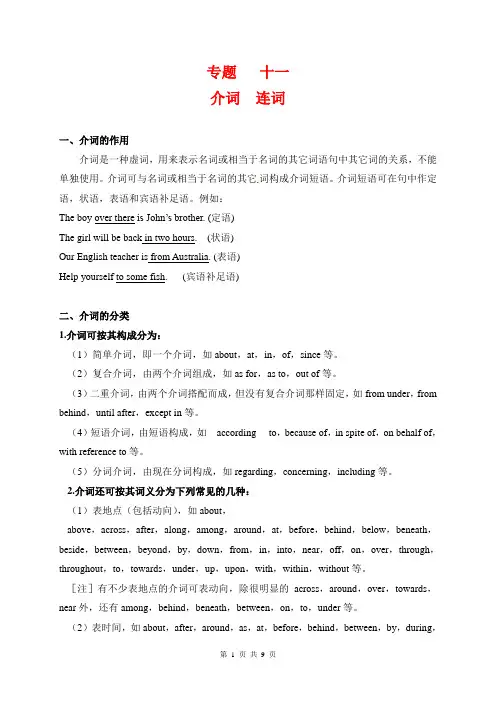
专题十一介词连词一、介词的作用介词是一种虚词,用来表示名词或相当于名词的其它词语句中其它词的关系,不能单独使用。
介词可与名词或相当于名词的其它词构成介词短语。
介词短语可在句中作定语,状语,表语和宾语补足语。
例如:The boy over there is John’s brother. (定语)The girl will be back in two hours. (状语)Our English teacher is from Australia. (表语)Help yourself to some fish. (宾语补足语)二、介词的分类1.介词可按其构成分为:(1)简单介词,即一个介词,如about,at,in,of,since等。
(2)复合介词,由两个介词组成,如as for,as to,out of等。
(3)二重介词,由两个介词搭配而成,但没有复合介词那样固定,如from under,from behind,until after,except in等。
(4)短语介词,由短语构成,如according to,because of,in spite of,on behalf of,with reference to等。
(5)分词介词,由现在分词构成,如regarding,concerning,including等。
2.介词还可按其词义分为下列常见的几种:(1)表地点(包括动向),如about,above,across,after,along,among,around,at,before,behind,below,beneath,beside,between,beyond,by,down,from,in,into,near,off,on,over,through,throughout,to,towards,under,up,upon,with,within,without等。
[注]有不少表地点的介词可表动向,除很明显的across,around,over,towards,near外,还有among,behind,beneath,between,on,to,under等。
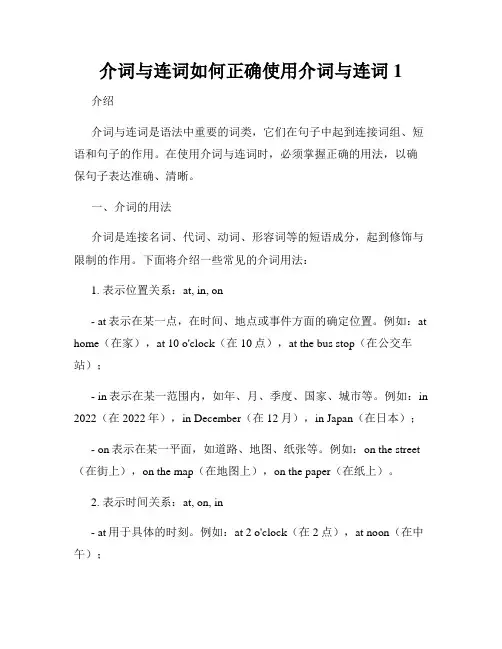
介词与连词如何正确使用介词与连词1介绍介词与连词是语法中重要的词类,它们在句子中起到连接词组、短语和句子的作用。
在使用介词与连词时,必须掌握正确的用法,以确保句子表达准确、清晰。
一、介词的用法介词是连接名词、代词、动词、形容词等的短语成分,起到修饰与限制的作用。
下面将介绍一些常见的介词用法:1. 表示位置关系:at, in, on- at表示在某一点,在时间、地点或事件方面的确定位置。
例如:at home(在家),at 10 o'clock(在10点),at the bus stop(在公交车站);- in表示在某一范围内,如年、月、季度、国家、城市等。
例如:in 2022(在2022年),in December(在12月),in Japan(在日本);- on表示在某一平面,如道路、地图、纸张等。
例如:on the street (在街上),on the map(在地图上),on the paper(在纸上)。
2. 表示时间关系:at, on, in- at用于具体的时刻。
例如:at 2 o'clock(在2点),at noon(在中午);- on用于具体的日期、星期几。
例如:on Monday(在星期一),on July 1st(在7月1日);- in用于表示较长的时间段,如年、季度、月份。
例如:in 2022(在2022年),in spring(在春天),in August(在8月)。
3. 表示从属关系:of, from, to- of表示所属关系,具有所有格的意味。
例如:the book of Mark(马克的书),the color of the sky(天空的颜色);- from表示出发地或起点。
例如:I am from China(我来自中国),the train from Shanghai(从上海开出的火车);- to表示到达地或终点。
例如:I am going to school(我去学校),from Beijing to Shanghai(从北京到上海)。
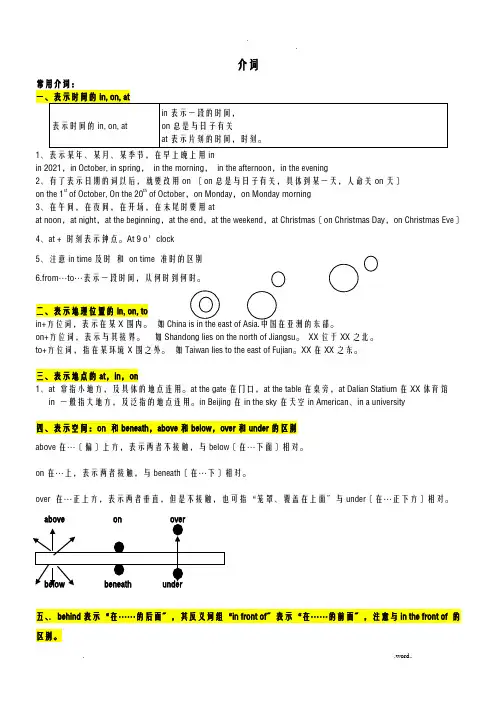
介词in 2021,in October, in spring,in the morning,in the afternoon,in the evening2、有了表示日期的词以后,就要改用on 〔on总是与日子有关,具体到某一天,人命关on天〕on the 1st of October, On the 20th of October,on Monday,on Monday morning3、在午间,在夜间,在开场,在末尾时要用atat noon,at night,at the beginning,at the end,at the weekend,at Christmas〔on Christmas Day,on Christmas Eve〕4、at + 时刻表示钟点。
At 9 o’clock5、注意in time及时和on time 准时的区别6.from…to…表示一段时间,从何时到何时。
二、表示地理位置的in, on, toin+方位词,表示在某X围内。
如on+方位词,表示与其接界。
如Shandong lies on the north of Jiangsu。
XX位于XX之北。
to+方位词,指在某环境X围之外。
如Taiwan lies to the east of Fujian。
XX在XX之东。
三、表示地点的at,in,on1、at 常指小地方,及具体的地点连用。
at the gate在门口,at the table在桌旁,at Dalian Statium在XX体育馆in 一般指大地方,及泛指的地点连用。
in Beijing在in the sky在天空in American、in a university四、表示空间:on 和beneath,above和below,over和under的区别above在…〔偏〕上方,表示两者不接触,与below〔在…下面〕相对。
on在…上,表示两者接触,与beneath〔在…下〕相对。

介词的分类和用法介词是虚词,不能单独作句子成分,必须与名词、代词(或相当于名词的其他词类、短语或从句等)构成介词短语,在句中充当一个成分。
介词分为:简单介词(at, in, for等);合成介词(within, inside, throughout等);短语介词(according to, because of, in spite of等);双重介词(from behind/above/under等);分词介词(considering, including等)。
介词后的宾语可以是名词、代词、动名词、疑问词+不定式、wh–clause等。
1.介词搭配介词的主要考查方式之一就是与动词、名词等搭配成短语,常用搭配形式如下:(1)介词+名词:in turn轮流;in danger在危险中;out of order出故障;by no means决不(2)名词+介词:reason for……的原因;effect/influence on对……的影响(3)形容词+介词:angry with生(某人)气;concerned about关心(4)动词+介词:laugh at嘲笑;agree on对……达成协议(5)动词+副词+介词:go in for爱好,从事;put up with忍受(6)动词+名词+介词:take advantage of利用;pay attention to注意(7)动词+sb/sth+介词:prevent sb from阻止某人做……;remind sb of提醒某人……2.核心介词用法归纳与辨析(1)表示方位的at, in, on, to, beside/by和near介词。
如:this morning, last year。
(5)表示时间段的for和since①besides(除……之外还有), except(意为“除了……”,后可接句子), but, other than,except for(意为“除了……”,后接短语)②with的复合结构:with+名词/代词+现在分词/过去分词/不定式/形容词/介词短语/副词,相当于一个状语从句。
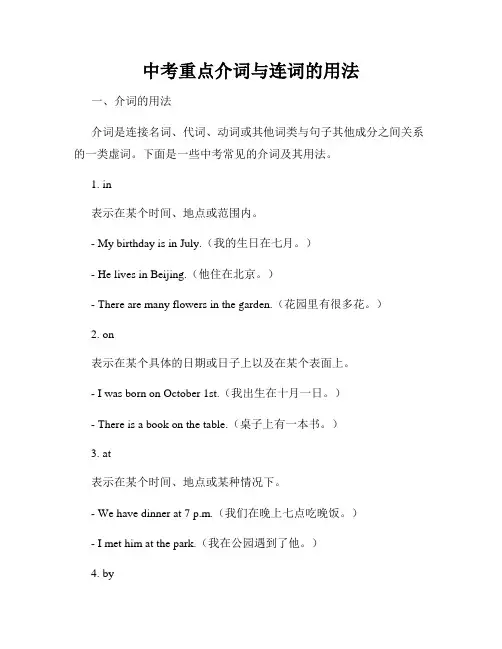
中考重点介词与连词的用法一、介词的用法介词是连接名词、代词、动词或其他词类与句子其他成分之间关系的一类虚词。
下面是一些中考常见的介词及其用法。
1. in表示在某个时间、地点或范围内。
- My birthday is in July.(我的生日在七月。
)- He lives in Beijing.(他住在北京。
)- There are many flowers in the garden.(花园里有很多花。
)2. on表示在某个具体的日期或日子上以及在某个表面上。
- I was born on October 1st.(我出生在十月一日。
)- There is a book on the table.(桌子上有一本书。
)3. at表示在某个时间、地点或某种情况下。
- We have dinner at 7 p.m.(我们在晚上七点吃晚饭。
)- I met him at the park.(我在公园遇到了他。
)4. by表示通过某种方式或方法。
- I usually go to school by bus.(我通常乘公交车去学校。
)- He sent the letter by mail.(他通过邮寄发送了这封信。
)5. for表示某个时间段、目的或原因。
- He has been waiting for two hours.(他已经等了两个小时。
)- I bought this gift for my sister.(我为我姐姐买了这个礼物。
)二、连词的用法连词主要用于连接词与词、短语与短语、句子与句子等。
以下是一些中考常见的连词及其用法。
1. and表示并列关系,连接同类词、短语或句子。
- I like apples and oranges.(我喜欢苹果和橙子。
)- He is tall and handsome.(他又高又帅。
)2. but表示转折或对比关系,连接两个相对的内容。
- She is poor but happy.(她虽然穷,但很快乐。
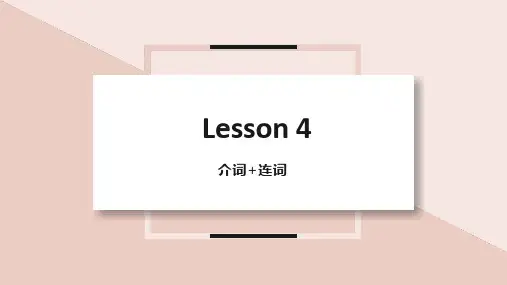
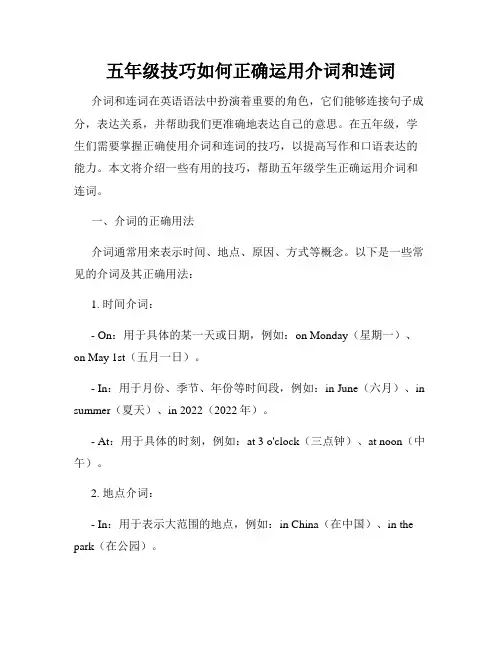
五年级技巧如何正确运用介词和连词介词和连词在英语语法中扮演着重要的角色,它们能够连接句子成分,表达关系,并帮助我们更准确地表达自己的意思。
在五年级,学生们需要掌握正确使用介词和连词的技巧,以提高写作和口语表达的能力。
本文将介绍一些有用的技巧,帮助五年级学生正确运用介词和连词。
一、介词的正确用法介词通常用来表示时间、地点、原因、方式等概念。
以下是一些常见的介词及其正确用法:1. 时间介词:- On:用于具体的某一天或日期,例如:on Monday(星期一)、on May 1st(五月一日)。
- In:用于月份、季节、年份等时间段,例如:in June(六月)、in summer(夏天)、in 2022(2022年)。
- At:用于具体的时刻,例如:at 3 o'clock(三点钟)、at noon(中午)。
2. 地点介词:- In:用于表示大范围的地点,例如:in China(在中国)、in the park(在公园)。
- On:用于表示具体的平面物体上,例如:on the table(在桌子上)、on the wall(在墙上)。
- At:用于表示具体的地点或建筑物,例如:at school(在学校)、at the cinema(在电影院)。
3. 原因介词:- Because of:用于表示原因,例如:I couldn't go to the party because of the heavy rain(因为下大雨,我不能去参加派对)。
- Due to:与"because of"相同用法,但更正式,例如:The game was canceled due to bad weather(比赛因为天气原因被取消了)。
4. 方式介词:- With:表示伴随,例如:I went to the park with my friends(我和我的朋友一起去了公园)。
- By:表示通过某种方式或手段,例如:I go to school by bus(我坐公交车去学校)。
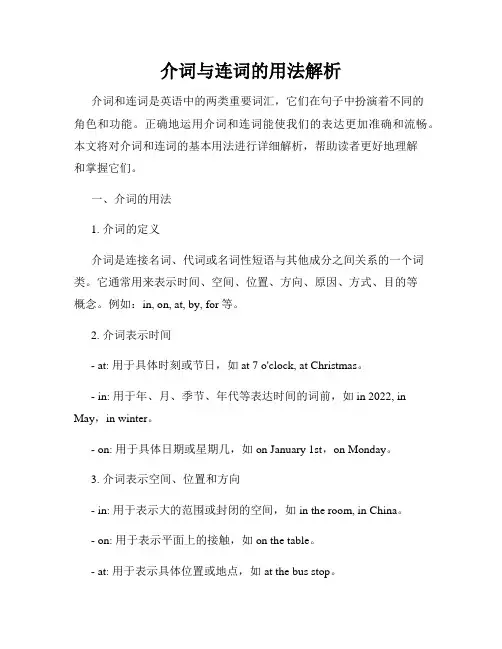
介词与连词的用法解析介词和连词是英语中的两类重要词汇,它们在句子中扮演着不同的角色和功能。
正确地运用介词和连词能使我们的表达更加准确和流畅。
本文将对介词和连词的基本用法进行详细解析,帮助读者更好地理解和掌握它们。
一、介词的用法1. 介词的定义介词是连接名词、代词或名词性短语与其他成分之间关系的一个词类。
它通常用来表示时间、空间、位置、方向、原因、方式、目的等概念。
例如:in, on, at, by, for等。
2. 介词表示时间- at: 用于具体时刻或节日,如at 7 o'clock, at Christmas。
- in: 用于年、月、季节、年代等表达时间的词前,如in 2022, in May,in winter。
- on: 用于具体日期或星期几,如on January 1st,on Monday。
3. 介词表示空间、位置和方向- in: 用于表示大的范围或封闭的空间,如in the room, in China。
- on: 用于表示平面上的接触,如on the table。
- at: 用于表示具体位置或地点,如at the bus stop。
4. 介词表示原因、方式和目的- for: 表示目的或原因,如for fun, for the sake of。
- by: 表示方式、方法或通过某种手段,如by bus, by email。
二、连词的用法1. 连词的定义连词是连接词语、短语或句子的词类。
它用于连接并列成分、并列句、主从句等,起到使句子结构更加完整和连贯的作用。
例如:and, but, or, so等。
2. 并列连词- and: 用于连接同类词、词组和句子,表示并列关系,如I like apples and oranges。
- but: 表示转折或对比关系,如She is smart but lazy。
- or: 表示选择关系,如Do you want tea or coffee?3. 从属连词- because: 引导原因状语从句,如I stayed at home because it was raining。
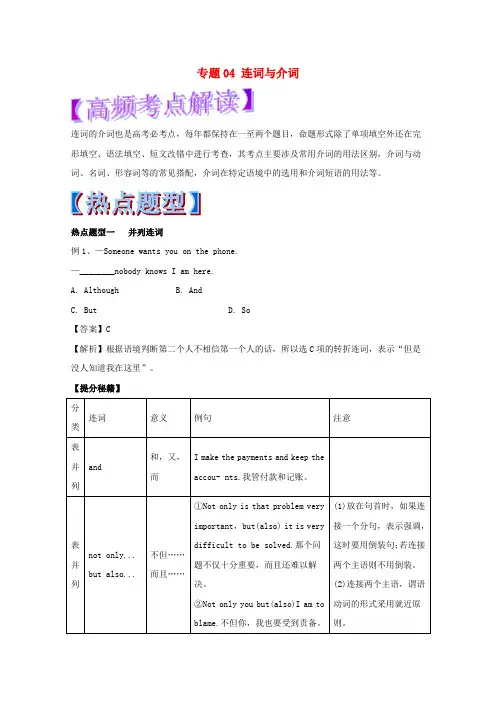
专题04 连词与介词连词的介词也是高考必考点,每年都保持在一至两个题目,命题形式除了单项填空外还在完形填空、语法填空、短文改错中进行考查,其考点主要涉及常用介词的用法区别,介词与动词、名词、形容词等的常见搭配,介词在特定语境中的选用和介词短语的用法等。
热点题型一并列连词例1、—Someone wants you on the phone.—________nobody knows I am here.A. AlthoughB. AndC. ButD. So【答案】C【解析】根据语境判断第二个人不相信第一个人的话,所以选C项的转折连词,表示“但是没人知道我在这里”。
【提分秘籍】【举一反三】There are fewer teaching positions left in big cities, ________at the same time there are shortages of teachers in small towns.A. orB. andC. soD. for【答案】B【解析】从语意可知,前后构成并列句,用and连接,在此处意为“而”。
热点题型二从属连词例2. ________ more and more forests were destroyed, some animals are facing the danger of dying out.A. ByB. WithC. AsD. For【答案】C【解析】考查连词和介词用法。
空格后是一个完整的句子,故用as来引导状语从句。
句意:随着越来越多的森林遭到破坏,一些动物正面临着灭绝的危险。
【提分秘籍】【举一反三】Jack wasn’t saying anything, but the teacher smiled at him ________he had done something very clever.A. as ifB. in caseC. whileD. though【答案】A热点题型三易混的介词例3、He was a good student and scored________average in most subjects.A. belowB. ofC. onD. above【答案】D【提分秘籍】1.over,above,on,beyond表示“在……上”(1)over一般表示“在……的正上方”“在……垂直上方”,其反义词是under;over还可表示在被覆盖在物体的上面。
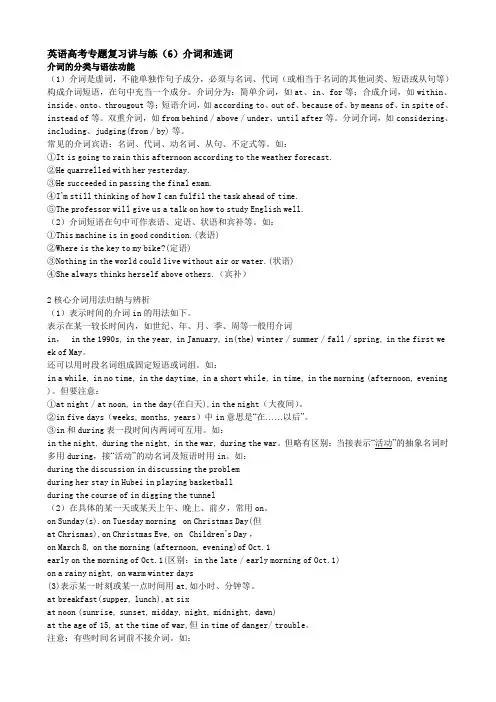
英语高考专题复习讲与练(6)介词和连词介词的分类与语法功能(1)介词是虚词,不能单独作句子成分,必须与名词、代词(或相当于名词的其他词类、短语或从句等)构成介词短语,在句中充当一个成分。
介词分为:简单介词,如at、in、for等;合成介词,如within、inside、onto、througout等;短语介词,如according to、out of、because of、by means of、in spite of、instead of等。
双重介词,如from behind/above/under、until after等。
分词介词,如considering、including、judging(from/by)等。
常见的介词宾语:名词、代词、动名词、从句、不定式等。
如:①It is going to rain this afternoon according to the weather forecast.②He quarrelled with her yesterday.③He succeeded in passing the final exam.④I’m still thinking of how I can fulfil the task ahead of time.⑤The professor will give us a talk on how to study English well.(2)介词短语在句中可作表语、定语、状语和宾补等。
如:①This machine is in good condition.(表语)②Where is the key to my bike?(定语)③Nothing in the world could live without air or water.(状语)④She always thinks herself above others.(宾补)2核心介词用法归纳与辨析(1)表示时间的介词in的用法如下。
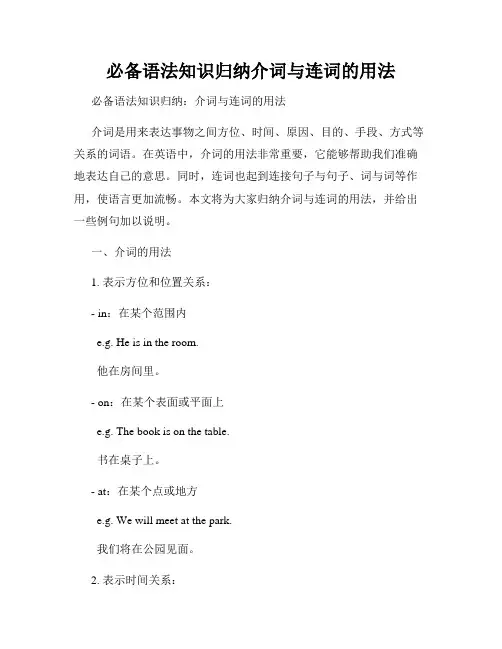
必备语法知识归纳介词与连词的用法必备语法知识归纳:介词与连词的用法介词是用来表达事物之间方位、时间、原因、目的、手段、方式等关系的词语。
在英语中,介词的用法非常重要,它能够帮助我们准确地表达自己的意思。
同时,连词也起到连接句子与句子、词与词等作用,使语言更加流畅。
本文将为大家归纳介词与连词的用法,并给出一些例句加以说明。
一、介词的用法1. 表示方位和位置关系:- in:在某个范围内e.g. He is in the room.他在房间里。
- on:在某个表面或平面上e.g. The book is on the table.书在桌子上。
- at:在某个点或地方e.g. We will meet at the park.我们将在公园见面。
2. 表示时间关系:- at:在某个具体时间点e.g. I will arrive at 8 o'clock.我将在8点钟到达。
- on:在某个具体日期或星期几e.g. My birthday is on February 14th.我的生日是在2月14日。
- in:在某个时间段或年份e.g. I will go on vacation in the summer.我会在夏天去度假。
3. 表示原因、目的、手段和方式:- for:表示目的e.g. I study hard for a better future.我努力学习是为了更好的未来。
- by:表示手段或方法e.g. I sent the letter by mail.我通过邮寄发送了信件。
- with:表示伴随或方式e.g. She walks with confidence.她步履自信地走着。
4. 表示从属或归属关系:- of:表示所属关系e.g. The book is the property of the library.这本书是图书馆的财产。
- to:表示从属关系e.g. He is a loyal servant to the king.他是国王的忠诚仆人。
介词常用介词:intheevening2、有了表示日期的词以后,就要改用on(on总是与日子有关,具体到某一天,人命关on天)onthe1st ofOctober,Onthe20th ofOctober,onMonday,onMondaymorning3、在午间,在夜间,在开始,在末尾时要用atatnoon,atnight,atthebeginning,attheend,attheweekend,in+on+方位词,表示与其接界。
如ShandongliesonthenorthofJiangsu。
山东位于江苏之北。
to+方位词,指在某环境范围之外。
如TaiwanliestotheeastofFujian。
台湾在福建之东。
三、表示地点的at,in,on1、at常指小地方,及具体的地点连用。
atthegate在门口,atthetable在桌旁,atDalianStatium在大连体育馆aboveonover.behind表示“在……的后面”,其反义词组“infrontof”表示“在……的芃五、前面”,注意与inthefrontof的区别。
Wemustkeepourhandsbehindourbacks.我们必须一直把手放在背后。
Iwaswalkingdownthestreetwhenafriendstoodinfrontofme.当一个朋室后面。
Theteacherisstandinginthemiddleoftheclassroom.老师在教室中间站着。
六、表“用”时“with+工具、手段”(with“和”),“by+交通工具(单数)”,“in+语言、嗓音”。
Mydaughterboughtsomebookswiththemoneyshehadsaved.我女儿用她节省的钱买了些书。
不hetakesthetraintoShenyangeveryyear.Iusuallytakethesubwaytogohome.2、by+表示交通工具的名词,表示泛指乘某种交通工具。
介词与连词如何正确使用介词与连词介词与连词如何正确使用介词与连词介词与连词在英语中起到连接句子、短语或词语的作用,帮助我们表达更加准确、清晰的意思。
正确运用介词与连词对于语句的结构和意义的表达具有重要影响。
本文将介绍介词与连词的基本概念、常见用法和注意事项。
一、介词的基本概念及常见用法介词是一类虚词,用于连接名词或代词与其他词语,表示位置、方向、时间、方式、原因等关系。
常见的介词包括in、on、at、for、with、to等。
1. 位置和方向关系:介词in表示“在……之内”,例如:in the room(在房间里);介词on表示“在……表面上”,例如:on the table(在桌子上);介词at表示“在……位置上”,例如:at the bus stop(在公交车站);介词over表示“在……上方”,例如:over the bridge(在桥上)。
2. 时间关系:介词in表示“在……时间内”,例如:in the morning(在早晨);介词on表示“在……日子”,例如:on Monday(在星期一);介词at表示“在……时刻”,例如:at six o'clock(在六点钟);介词for表示“持续时间”,例如:for two hours(持续两个小时)。
3. 方式和原因关系:介词with表示“用……”,例如:with a pen(用一支笔);介词by表示“通过……方式”,例如:by bus(乘坐公交车);介词for表示“为了……”,例如:for fun(为了娱乐);介词because of表示“因为……”,例如:because of the rain(因为下雨)。
二、连词的基本概念及常见用法连词是一类用于连接词语、短语或句子的虚词,起到衔接、并列、选择、转折等作用。
常见的连词包括and、but、or、so、although、because等。
1. 并列关系:连词and表示“和”,用于连接同类的词或短语,例如:apples and oranges(苹果和橙子);连词or表示“或者”,用于提供选择的情况,例如:tea or coffee (茶或咖啡);连词but表示“但是”,用于表示转折关系,例如:I like music, but I don't like dancing(我喜欢音乐,但是我不喜欢跳舞)。
小升初英语语法学问专项练习介词与连词一、单项选择1.Is it a man ____a woman?A. andB. orC. with2.It’s time ____breakfast.A. ofB. atC. for 3.Welcome________my home.A.to B.too C.two 4.Look at this photo ____her.A. withB. ofC. for5.I was born ____ the year of the tiger.A. atB. onC. in6.How did you go to Shanghai?—We went there ____air.A. byB. inC. at7.My parents like to go ______ a walk.A. toB.atC. for 8.Mocky had a birthday gift Ken.A onB inC for9.She buy a card ______ me.A .on B. to C. for10.— What is forty ______ twenty?— It is sixty.A. andB. orC. so11.He gave a box of chocolate _____ me.A. fromB. toC. for 12.Please send an email _____me.A.toB.forC.on 13.He is wearing a blue suit ____a silver tie.A. withB. inC. of 14.---W here is the teachers’ office?---It’s _________ the second floor.A.onB.inC.near 15.My family have been living in Chengdu ______ Iwas born.A. forB. whileC.sinceD.when 16.Are you going to take part ________ the meeting?A. onB. atC. in 17.The hospital is next____the museum。
初中英语语法专项练习八——介词一.选择填空:1.Mrs. Brown came to China ____ 1996.A.from B.of C.to D.in2.The room was full ____ smoke after the big fire.A.of B.with C.in D.for3.Here are some presents ____ you ____ our best wishes.A.to; with B.for; with C.of; about D.for; for4.Both Mr Green and Mrs Green were born ____ June, 1956.A.in B.at C.on D.for5.The little boy is always interested ____ science.A.with B.by C.in D.at6.Li Lei often gets up ____ seven o'clock on Sundays.A.on B.in C.at D.for7.They arrived early ____ a Tuesday morning.A.on B.at C.in D.of8.Macao(澳门)will return to our motherland ____ December 20th, 1999.A.on B.at C.in D.for9.----When were you born? ----I was born ____ August 25, 1983.A.on B.in C.at D.to10.Let me show you the place ____ the map.A.with B.on C.in11.John knows ____ a computer.A.how to use B.how use C.how uses12.The visitors ____ Japan arrived ____ Beijing Station last Tuesday morning. A.from; at B.of; to C.from; to D.of; on13.The teacher will be back ____ an hour.A.in B.after C.on14.This programme was sent to the USA ____ China ____ satellite.A.in; of B.of; in C.from; by D.by; from15.It's cold outside. Please your warm clothes.A. put inB. take offC. put onD. put up16.He got many gifts his birthday his friends.A. on, fromB. in, ofC. at, toD. from, for17.The classroom is quite different that one.A. ofB. fromC. withD. like18.Look, you'll see a bridge the river.A. onB. aboveC. overD. in19.–Your coat looks nice, Is It cotton? -Yes. It's Shanghai.A. made of, made byB. made of, made inC. made for, made inD. made from made by20.Tow may fall the others because he has missed so many lessons.A. afterB. behindC. laterD. out of二、用适当的介词填空1.What's wrong ____ your watch?2.One ____ the students is in the classroom.3.I think the shop is closed ____ this time of day.4.My father teaches English ____ a school.5.We have lunch ____ the middle of the day.6.You can buy some school things ____ your way home.7.I was born ____ July 1, 1982.8.May I borrow a pencil ____ you?9.Don't sleep ____ the open air.10.I often help my mother ____ _ the housework.11.It's time ____ school.12.I have quite a lot ____ homework to do.13.What's the time? It's half ____ seven.14.Ducks are good ____ swimming.15.What are you talking ____ ?16.He is sitting ____ the front of the car.17.The eraser was passed ____ one student ____ another. 18.Did you live ____ Beijing in 1997?19.When did you arrive ____ the village?20.I think Mary is ____ duty today.21.Eating too much isn't good ____ your health.22.I'm afraid he is ____ the cinema ____ the moment. 23.Thanks ____ asking me to your party.24.My watch is very different ____ yours.25.What's the weather ____ today?26.The student is asking his teacher ____ the sports meeting. 27.The farmers are all getting ready ____ the next year. 28.The radio says the wind will stop later ____ the day. 29.Let's go out ____ a walk, shall we?30.Tom, your mother is waiting ____ you.31.We have noodles for lunch for lunch ____ times. 32.Harerbin is ____ the north of China.33.The day ____ tomorrow will be windy.34.Don't worry ____ your test.35.I don't know which is the way ____ the park.36.An old woman is ____ the side of the road.37.____ the end of the road you'll see the hospital38.He left Tokyo ____ a visit ____ Beijing.39.Don't laugh ____ other people's mistakes.40.He did this instead ____ me.41.The people here are very friendly ____ us.42.Does he learn English ____ himself?43.I felt a little afraid ____ my teacher.44.I'm afraid he'll fall ____ the bike.45.Help yourselves ____ some fish, Lily and Lucy.46.____ these words he left the classroom.47.It was a pleasure ____ me.48.I'm sorry I'm late ____ the meeting.49.Study hard, or you won't catch up ____ your classmates. 50.Not far ____ him was Lin Tao.Lin Tao ran fast, too. 51.Mr Wu is going to tell us the result ____ once.52.He goes to school early ____ usual.53.It's another way ____ saying fast.54.I'm sorry he doesn't agree ____ me.55.He prefers playing football ____ playing basketball.56.What do you mean ____ baozhi?57.Don't play ____ fire.It's dangerous.58.He didn't go ____ bed until twelve o'clock.59.My teacher was angry ____ me.60.Someone is knocking ____ the door.61.Have you heard ____ Jim yet?62.If you break the window, you'll have to pay ____ it.63.I'm sorry.I won't talk to others in class ____ now on.64.What have you done ____ the milk?65.The students walked ____ the gates with Uncle Wang.66.Are you ____ trouble, Jim?67.My mother is ill.I have to send ____ the doctor.68.The doctor operated ____ my mother at once.69.The glass is full ____ milk.70.I saw him ____ the crowd.71.There are a group of sheep ____ the foot of the hill.72.We are twins.People often mistake us ____ each other.73.The knife is made ____ metal and wood.74.Ships can travel ____ the world.75.He watched me ____ surprise.76.Choose my subject.Something about English, ____ example.77.Tie the horse ____ the tree.78.Nothing can stop us ____ studying hard.79.____ Mr Wang's help, I have passed the exam.80.Please cut the metal ____ some pieces.81.I feel ____ going for a walk.82.We can finish the work ____ a week.83.Are you interested ____ the film Titanic?84.Hundreds ____ years ago, there was a village here.85.What ____ earth can you see?86.When did you join us ____ the game?参考答案:一、1.D.在年代前面用介同in2.A.full of是一个短语,意为“充满……”3.B.给“谁”的礼物,用介词for,with表示“带(着)”4.A.在年、月名称前用介词in,而在日期前则用on5.C.be/get/become interested in 对……感兴趣6.C.在“几点钟”,用at7.A.在“早、午、晚”前面,用介词in,但在具体某一天的“早、午、晚”前则用on 8.A.9.A.在日期前用介词on10.B.注意:on the map,on the paper,in the newspaper,in the book,这些短语中用不同的介词11.A.teach,tell,ask,learn等动词后可接“疑问词+to不定式”结构作宾语12.A.第一空填from表示“来自”;第二空填at是因为后面的名词中心词是station 13.A.in后面接表示一段时间的短语,用在一般将来时态中,表示“多长时间以后”14.C.from表示“从……”,by satellite通过卫星15.从句意理解,意为穿上暖和的衣服,应选 C16.具体某一天用介词 on,从朋友处得到礼物用from,故应选A17.be different from为固定搭配,应选B18.on表示河面上,above表示河上方,in表示河里,而over表示桥跨两岸,故应选C 19.衣服看出原料用 be made of,在哪里制造用be made in,故应选B20.意为他可能落后于其他人,落后为 fall behind,应选B1.with.What’s wrong with sb./sth.?某人/某物怎么啦?2.of.one of………之一此句的主语是one,of短语作定语3.at.at this time of day 在一天当中的这个时候4.at.at a(the)school在学校;at school在校读书5.in.in the middle of 在……(时间、地点的)中间6.on.on one's way(home)在某人(回家)的路上,way后面常接“to+名词短语”,表示……在去……的路上,因此句中的home是副词,故其前不加to7.on8.from.borrow…from从(某人或某处)借(入)某物比较 lend sth.to sb.把某物借(出)给某人9.in.in the open air“在野外/露天”,也可说成 in the open10.with.help sb.with.sth.帮助某人做某事11.for.注意 time的两种句型:It’s time for…(名词) It’stime to do sth.两个短语的意思都是:“该做某事了”或“做某事的时间到了”12.of.a lot of “许多”该短语既可修饰可数名词,也可修饰不可数名词此短语也可说成 lost of(多用于书面语)13.past.past意为“过……(多少时间)”14.at.be good at擅长……15.about.talk about 谈论,talk to 和……交谈16.in.in the front of……(物体内部)的前面比较 in front of 在……(物体外部)的前面17.from;to.from one to another从一个到另一个18.in.在较大的地名前用介词in19.at.到达小地方用介词at20.on.on duty值班、值日21.for,be good/bad for表示客观事物对某人如何,所以其它主语多为something或动名词be good/kind/friendly/bad to 多指某人对某人如何,其主语多为somebody 22.at; at.at the cinema 在电影院,at the moment 此刻、现在23.for.Thanks(Thank you)for(doing)sth.谢谢你(做某事)24.from.different from…与…不同25.like.like意为“象……”26.to.ask sb.to sth.邀请某人参加某项活动27.for.get ready for为……准备28.in.in the day在白天,也中说成 in the daytime29.for.go out for a walk出去散步30.for.wait for等待31.at.at times有时,间或32.in.in the north of 在……(内部的)北部33.after.the day after tomorrow后天34.about.worry about为……担心35.to.50.at 51.Atat the end在……的末端,末尾36.for;to.for a visit中的for表目的;a visit to…表“参观37.at.laugh at嘲笑38.of.instead of代替39.to.56.by oneself由自己40.of.feel afraid of感到害怕……,be afraid of害怕……41.off.fall off从……上摔下来42.to.help oneself to sth.随便吃/用/拿某物43.With.With these words说完这些话44.for.表示“(客观上)对……来说”45.for.be late for(做某事)迟到了46.with.catch up with 赶上47.behind.表示Lin Tao在he的后面此处用behind强调前后位置far后面还可接介词from,表示“远离”48.at.at once立即49.as.as usual象往常一样50.of.way of doing sth.做某事的方法way后面还可接to不定式做定语51.with.agree with同意某人的看法52.to.prefer(doing)sth.to(doing)sth.喜欢……胜过喜欢53.by.What do you mean by…?你(那么)说是什么意思?54.with.play with 玩弄……55.to56.with.be angry with 生某人的气57.at.knock at(on)敲58.from.hear from收到某人的来信59.for.pay for付……的钱此处作“赔偿”讲60.from.from now on从今往后61.with.do with处理、对付62.through63.in.in trouble陷入困境64.for.send for派人去请65.on.operate on给……做手术66.of67.among.among the crowd在人群中68.at.at the foot of在……脚下69.for.mistake…for…把……错当成……70.of.be made of由……制成(看得见原材料)比较 be madefrom 由……制成(看不见原材料)71.around.around the world全世界72.in.in.surprise惊奇地73.for.for example“例如”可置于句首、句中或句尾,只举出一个例子74.to.tie…to…把……绑在……上75.from.stop sb.from doing sth.阻止某人做某事76.With.with one’s help在……的帮助下77.into.cut…into pieces把……切成碎片78.like.feel like(doing)sth.想要(做)某物(事)79.in.in前面用can之类的情态动词,in表示“在……(多长时间)之内”;in与一般将来时连用,表示“在……(多长时间)之后”80.in81.of.hundreds of数以百计的82.on.此处意为“到底、究竟”,用在疑问词后on earth还可指“在世界上、在人世间”83.in.join sb.in sth.参加某人的活动初中英语语法专项练习九——连词1. He can speak English_______ Chinese.A. butB. alsoC. soD. and2. Physics is not so easy, _______I like it very much.A. butB. orC. sinceD. because3. Will Tom wait for her at home ______ at the library?A. orB. asC. so thatD. both4. She has a son _______ a daughter.A. butB. andC. soD. or5. I'll give her the gift ______ she arrives.A. soB. beforeC. as soon asD. since6. Tom was ____ill that we had to send for a doctor.A. soB. veryC. andD. too7. The woman was____ angry_____ she couldn't speak anything.A. neither…norB. either…orC. both…andD. so…that8. ______we got home it was very late.A. WhenB. WhileC. BecauseD. As9. We heard clearly_____ she said.A. whatB. whichC. beforeD. because10. I can't sleep well at night, ______I often feel very tired in the day.A. soB. becauseC. andD. or11. When you're learning a foreign language, use it, ______ you will lose it.A. butB. orC. thenD. and12. --- Can you play football?--- Yes, I can, ______ I can't play it very well.A. orB. andC. butD. so13. Study hard, ______ you will fall behind.A. andB. butC. soD. or14. My favorite is action movie ______ I think it's exciting.A. andB. becauseC. butD. so15. The boy is very smart, ______ many of his classmates like him.A. butB. soC. orD. for16. He has never heard______ seen such a thing before.A. norB. andC. orD. since17. _________ John _______I are policemen.A. Neither ... norB. Either ... orC. Both ... andD. Not only... but also18. Mr Smith teaches ______well ______ his lessons are not easily forgotten.A. very ... thatB. quite ... butC. so ... asD. so ... that19. He didn't go to sleep ______he finished his homework.A. tillB. beforeC. afterD. until20. I didn't buy the dictionary yesterday ________ my aunt would give me one.A. untilB. becauseC. ifD. before21. The runner fell _______ he quickly got up and went on running.A. orB. andC. butD. down22. Wait for me in the room _______ I come back.A. untilB. andC. soD. or23. I'll return the books to the library ______ soon as possible.A. asB. soC. justD. but24. Go along the road, _______ you'll find the market at the end of it.A. whenB. andC. orD. though25. You'll be late ______ you don't get up early tomorrow morning.A. ifB. whenC. beforeD. until26. It was late. She washed her face ______ went to bed.A. orB. andC. soD. but答案:1-5 DAABC 6-10 ADAAA 11—15 BCDBB16-20 CADDB21-26 CAABAB。
六年级英语介词与连词训练练习题30题答案解析1.She has an English class ____ Monday.A.inB.onC.at答案解析:B。
on 用于具体的某一天,Monday 是具体的一天,所以用on。
in 用于较大的时间范围,如in May。
at 用于具体的时刻,如at seven o'clock。
2.My birthday is ____ July.A.inB.onC.at答案解析:A。
in 用于较大的时间范围,July 是一个月,所以用in。
on 用于具体的某一天。
at 用于具体的时刻。
3.We usually go to school ____ seven in the morning.A.inB.onC.at答案解析:C。
at 用于具体的时刻,seven in the morning 是具体的时刻,所以用at。
in 用于较大的时间范围。
on 用于具体的某一天。
4.The sports meeting is ____ April 5th.A.inB.on答案解析:B。
on 用于具体的某一天,April 5th 是具体的一天,所以用on。
in 用于较大的时间范围。
at 用于具体的时刻。
5.My mother gets up early ____ the morning.A.inB.onC.at答案解析:A。
in the morning 是固定搭配,表示在早上。
on 用于具体的某一天。
at 用于具体的时刻。
6.We have a picnic ____ Sunday afternoon.A.inB.onC.at答案解析:B。
on 用于具体的某一天的上午、下午或晚上,Sunday afternoon 是具体的一天的下午,所以用on。
in 用于较大的时间范围。
at 用于具体的时刻。
7.The concert is ____ 8 pm.A.inB.onC.at答案解析:C。
七年级语法知识一.教学内容:介词及连词二.重点、难点:介词及连词用法专项练习[具体内容]一.介词(一)表示时间的介词(1)at①接具体时间:eg. at six, at half past two, at ten to twelve②表示“在.. 时刻”;eg:at noon, at midnight(2)in①表示“在(某段时间段)之间”;eg. in January, in a month, in spring, in 2005②在将来时中,表示“在某段时间之后” eg. In ten years, I think I,ll be a reporter.(3)on表示在具体的某一天或某一天的上午、下午或晚上等。
eg. On Monday, On Tuesday afternoon, On May 4th, On the morning of July 6th(二)固定搭配的介词(1) 动词 +介词:100k after, look at, look for, laugh at, listen to, hear from, turn on, turn off, wait for, worry about, think of, spend…on(2)介词 +名词:by train, on foot, at the end of, at last, in the end, in trouble, at table, at breakfast, in hospital, in time, on time, on one,s way to, with pleasure(3)be+形容词 +介词:be afraid of, be good at, be good/ bad for, be late for, be interested in, be angry with, be full of, be sorry for二.连词(conj.)用来连接词与词或句与句(1)并列连词(用来连接平行的词、词组或分句)①表并列关系:not only...but also, neither...nor, and②表选择关系:or, either...or③表转折关系:but, while④表因果关系:for, so(2)从属连词(用来引导从句)①引导时间状语从句:after, before, when, while, as, until, till, since, as soon as②引导原因状语从句:because, as, since③引导目的状语从句:so that, in order that④引导结果状语从句:so that, so...that, such...that⑤引导比较状语从句:than, as...as⑥引导宾语从句:that, if, whether【典型例题】介词是一种虚词,它不能单独使用,后面要踉名词、人称代词宾格或动名词。
介词常用介词:1、表示某年、某月、某季节,在早上晚上用inin 2012,in October, in spring,in the morning,in the afternoon,in the evening2、有了表示日期的词以后,就要改用on (on总是与日子有关,具体到某一天,人命关on天)on the 1st of October, On the 20th of October,on Monday,on Monday morning3、在午间,在夜间,在开始,在末尾时要用atat noon,at night,at the beginning,at the end,at the weekend,at Christmas(on Christmas Day,on Christmas Eve)4、at + 时刻表示钟点。
At 9 o’clock5、注意in time及时和on time 准时的区别…to…表示一段时间,从何时到何时。
二、表示地理位置的in, on, toin+方位词,表示在某范围内。
如on+方位词,表示与其接界。
如Shandong lies on the north of Jiangsu。
山东位于江苏之北。
to+方位词,指在某环境范围之外。
如Taiwan lies to the east of Fujian。
台湾在福建之东。
三、表示地点的at,in,on1、at 常指小地方,及具体的地点连用。
at the gate在门口,at the table在桌旁,at Dalian Statium在大连体育馆in 一般指大地方,及泛指的地点连用。
in Beijing在北京in the sky在天空in American、in a university四、表示空间:on 和beneath,above和below,over和under的区别above在…(偏)上方,表示两者不接触,与below(在…下面)相对。
on在…上,表示两者接触,与beneath(在…下)相对。
over 在…正上方,表示两者垂直,但是不接触,也可指“笼罩、覆盖在上面”与under(在…正下方)相对。
五、.behind表示“在……的后面”,其反义词组“in front of”表示“在……的前面”,注意与in the front of 的区别。
We must keep our hands behind our backs.我们必须一直把手放在背后。
I was walking down the street when a friend stood in front of me.当一个朋友站在我面前时,我正沿着街道散步。
There is a blackboard in the front of the classroom.。
教室的前面是黑板.at/in the front of 表示“在……里面的前部”,at the back of表示“在……里面的后部”,in the middle of 表示“在……的中部”。
Xiao Ming sits at/in the front of the classroom.小明坐在教室前面。
The twin sisters sits at the back of the classroom.那对双胞胎姐妹坐在教室后面。
The teacher is standing in the middle of the classroom.老师在教室中间站着。
六、表“用”时“with+工具、手段”(with“和”),“by+交通工具(单数)”,“in+语言、嗓音”。
My daughter bought some books with the money she had saved.我女儿用她节省的钱买了些书。
He told us something interesting in Japanese.他用日语告诉了我们一些有趣的事情。
As a middle school student, don't write with a pencil.作为一个中学生,不要用铅笔写字。
He always goes to school by bus. 他总是坐公共汽车去学校。
交通方式常用的表达方法1、take + the + 表示交通工具的名词,在句中做谓语。
he takes the train to Shenyang every year.I usually take the subway to go home.2、by + 表示交通工具的名词,表示泛指乘某种交通工具。
by bus、by bike、by train、by taxi、by subway、by ship=by sea=by water、by plane=by air=on a plane、on foothe goes to Shenyang by train every year.I usually go home by subway.3、on、in + 限定词+ 表示交通工具的名词,可用来表示具体的交通方式。
一般情况下,无厢、无舱的只能用on,如on the bike,其他的既可以用in,也可用on。
如in\on the plane。
但是只能说in the car、in the taxi,不能说on the car、on the taxi。
I hope more and more people go to work on their bikes.I usually take my daughter to school in my car.4、动词+ to + 地点名词,动词有walk、ride、drive、fly等可直接表达交通方式,后接to可跟地点名词,表示“通过、用……去某地”I hope more and more people ride to work.I usually drive my daughter to school.七、表示“在……上”时,不是都用“on”,有时须用in。
在树上in the tree 用于指树上的鸟、人等。
on the tree用于指生长在树上的叶子、果实。
在墙上in the wall镶嵌在墙内,指窗户、门、钉子等。
on the wall在墙的表面之上,指地图、画像等。
在报纸上in the newspaper用于指报上的内容。
on the newspaper用于指放在报纸上的东西,如眼镜等。
八.“across+表面”表示“横过”;“through+空间”表示“穿过”、“贯穿”;“over”表示从上面“越过”The Changjiang River is too wide for so young a boy to swim across.长江太宽了,这么小的孩子游不过去。
The plane flew over the high mountains.飞机飞越了群山。
The sunshine got into the room through the glass. 阳光透过玻璃进入房间。
九、从属关系中用“to” 的情况the key to the door门的钥匙,an answer to the question 问题的答案,a reply to our letter 对我们信的答复,the entrance to the building 大楼入口处,the monument to the heroes 英雄纪念碑注意:◆in+颜色,表示穿着…… in red, Mary is in red today.玛丽今天穿了一件红衣服。
◆in + Row/ Team/ Class/ Grade等,表示“在……排/队/班级/年级”等。
◆in the desert在沙漠、in the forest在森林、in the grassland在草原、in the jungle在热带丛林、in thewild在野外、在荒野(应注意此类短语中有the。
)◆in the sun(在阳光下) 、in the sky(在天上)、in bed(在床上)、in the middle of(在中间)、in the street(在大街上)in the world在世界上、in one’s life在(某人)一生中、He is in his twenties. 他二十几岁了。
◆on the right(在右边)、on the left(在左边)、on the right side of 在什么的右边、on the other side of 在什么的另一边◆on/in the playground在操、on the farm=on farm在农田、on the river在河边河畔、on the coast在海岸边、on the east coast of 在…东海岸、◆on the phone在电话里,通过电话、on/over the radio在收音机里、on TV在电视上、on the computer在电脑里、on the Internet在因特网上(go online上网上线)◆at work(在工作)、at school(上学)、at home(在家)应注意此类短语中无the。
◆at the age of ten在他十岁时间、at the same age同岁、at the foot of the hill(在山脚下)、at the North Pole在北极、at the South Pole在南极、at the speed of…以…速度、at the price of…以…价格、◆yesterday、tomorrow、today、last…、next…、this…前面不该用任何介词.the night before last.“在前天的夜里”,与“在前天”the day before yesterday相仿,前面不该用任何介词,连词连词是一种虚词,它不能独立担任句子的成分而只是起连接词与词、短语与短语、句子与句子的作用,它的用法通常是通过辨析词义来使用。
1、常见的连词and 和(表连接)but 但是(表转折)if 如果(表条件)so 所以(表结果)because 因为(表原因)then 那么(表承接)or 或者(表选择)2、易混淆的连词辨析(1)and和or:在并列结构的句子中,or通常用于否定句and 用于肯定句(2)so 和because:because意为“因为”,so意为“所以”,但是英语中不可以用because…so…表示因果关系。
(3)表示二者之间的联系:both…and…(两者都…), not only…but(also)…(不但……而且……),neither…nor…(既不……也不……)介词练习一、填空。